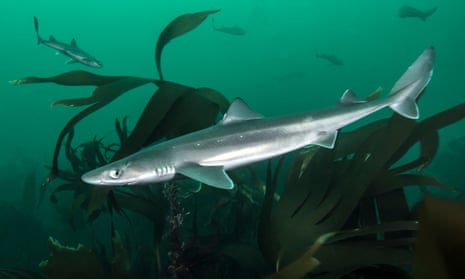Fish and chip shops and fishmongers are selling endangered sharks to an unwitting public, according to researchers who used DNA barcoding to identify species on sale.
Most chip shop fish sold under generic names such as huss, rock, flake and rock salmon turned out to be spiny dogfish, a shark species classified as endangered in Europe by the International Union for the Conservation of Nature’s red list.
Researchers at the University of Exeter also found fins of shark species unknowingly sold by a British wholesaler included scalloped hammerheads, which are endangered globally, as well as shortfin mako and smalleye hammerhead sharks.
Other species sold in fish and chip shops and fishmongers included starry smooth-hounds, nursehounds and blue sharks.
It was illegal to catch spiny dogfish in the EU until 2011 but the fish is now permitted to be sold as bycatch – when it is brought up in nets that target other species.
The government allows many shark species to be sold under long-used generic names such as rock but the researchers are calling for more accurate food labelling – with fish clearly identified at the point of sale to consumers – so people know what species they are eating and where it came from.
“It’s almost impossible for consumers to know what they are buying,” said Catherine Hobbs of the University of Exeter, and first author of the paper published in Scientific Reports. “People might think they’re getting a sustainably sourced product when they’re actually buying a threatened species.
“There are also health issues. Knowing what species you are buying could be important in terms of allergies, toxins, mercury content and the growing concern over microplastics in the marine food chain.”
Fins are more difficult to label because they are removed as soon as the sharks are caught but Hobbs said there was still an issue with “certain fishermen who don’t specifically adhere to the laws of labelling” when fish are landed.
“The discovery of endangered hammerhead sharks highlights how widespread the sale of declining species really is – even reaching Europe and the UK,” said Dr Andrew Griffiths, also of the University of Exeter. “Scalloped hammerhead can be imported under strict conditions, but the wholesaler had no idea what species the fin belonged to.”
The study analysed 78 samples from chip shops and 39 from fishmongers, mostly in southern England, as well as 10 fins from a wholesaler that sells them to restaurants and specialist supermarkets.
